France’s Literary Star, Leïla Slimani, on Writing a “Very Bad and Very Boring” First Novel
June 14, 2018 | Filed in: Woman of the Week
Since publishing her first novel in 2014, French-Moroccan writer Leïla Slimani has become one of France’s brightest, most fearless literary stars. She is also known for exploring taboo subjects: Her first book, Dans le jardin de l’ogre (“In the Garden of the Ogre”), tells the story of a sex addict; her second, Chanson douce (“Soft Song”), chronicles a homicidal nanny. The latter won the Prix Goncourt, France’s highest literary honor, in 2016, and is now available in English as The Perfect Nanny. Most recently, Slimani published a book of interviews with Moroccan women about their sex lives, Sexe et Mensonges: La Vie Sexuelle au Maroc (“Sex and Lies: Sex Life in Morocco”), a particularly controversial subject given the country’s strict laws governing pre- and extra-marital sex. We recently spoke with Slimani about the myths of being a good mother, how her first novel was “very bad and very boring,” and what it means to be “born under a good star.”
AFTER I CAME TO FRANCE for university, I went to an acting school for two years. Then I realized I didn’t want to be an actress, because I didn’t like the idea of waiting for someone to put me in a movie or in the theater. So I decided to be a journalist, and I worked for five years at a magazine called Jeune Afrique. I wrote mainly about gender equality for young people in Tunisia and Morocco, where there are many problems with education, public health, and unemployment.
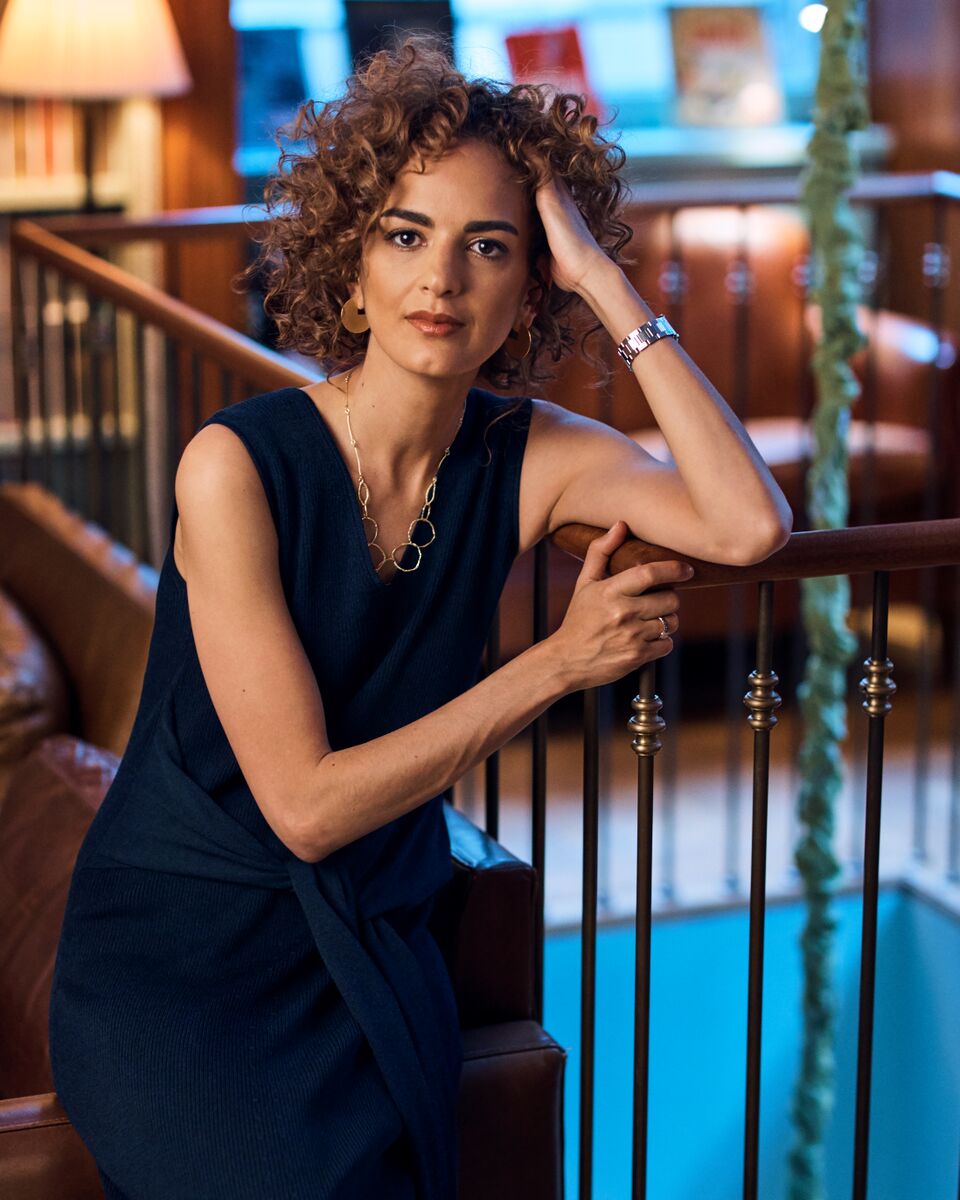
Leïla wears the Chell dress in navy, the Helene necklace, and the Henrietta earrings.
I’VE ALWAYS WRITTEN, EVEN AS A LITTLE KID. In my family, it was very natural to write stories and letters. Journalism was very good for me, because I learned how to write articles on deadlines. When you’re a reporter, you have to go to a place that you don’t know, meet people, and try to make them speak. You have to observe what’s happening around you constantly.
IT SOUNDS MORE DRAMATIC THAN IT REALLY WAS, but when I was reporting a story in Tunisia, during the Arab Spring, I was arrested along with a photographer who was with me. We were in custody and they took my computer and camera. They let us go after I called my publisher and he got them to release us. At the time, my son was about one year old. After that experience, as a young mother, I thought maybe it was a good time to stay home for a little bit, and try to write a novel.
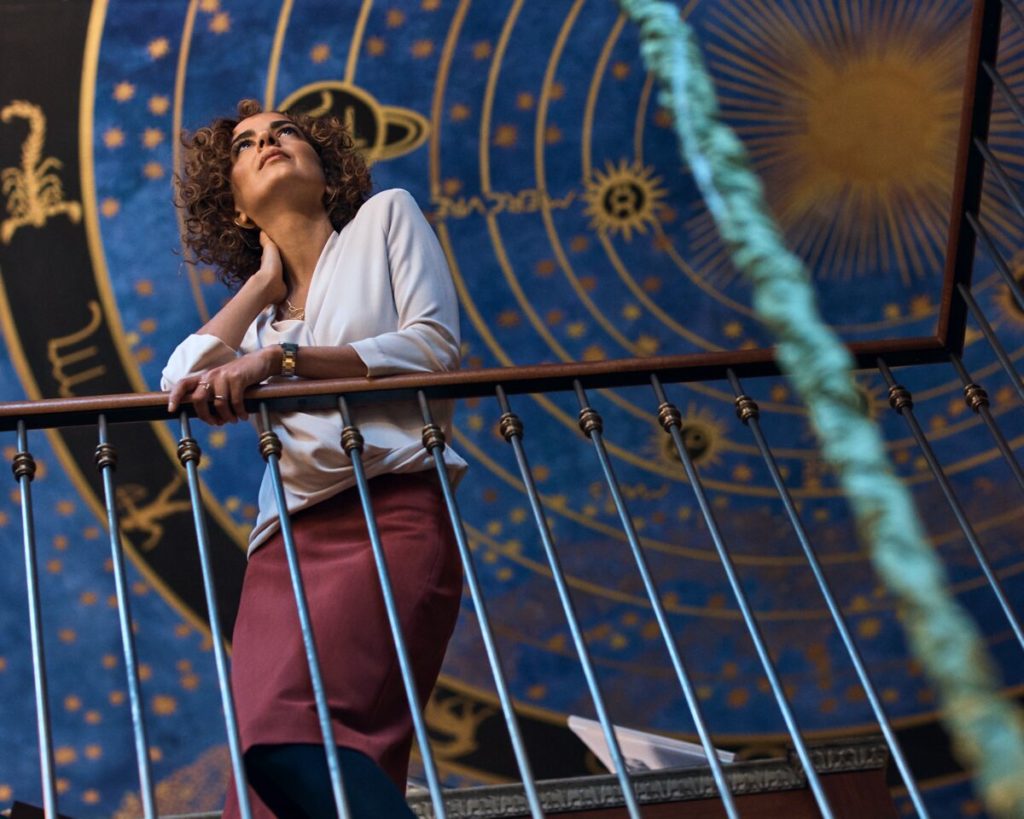
Leïla wears the Deneuve top in champagne and the Noho skirt in pomegranate.
WHEN I DECIDED TO QUIT MY JOB TO WRITE, my former colleagues said, “Oh, okay, you’re going to spend time with your child.” And I said, “No, I’m going to write.” And they said, “That will be nice. You will be with your child.” And I said, “No, I’m still going to work!”
THE TRUTH IS, I DIDN’T HAVE A BIG PLAN. I knew I wanted to write, but I had never really thought about what I was going to write. The first novel I wrote was about a mother and daughter living in a country undergoing a revolution. It was very bad and very boring, and I’m very ashamed that I wrote such a thing. But I think it was important for me to write it. I sent it to a lot of publishing houses and one publisher called me back and said, “The novel is not good, but you have something, and we feel that maybe you are a writer, so you shouldn’t stop.” They told me to be persévérant, as we say in French. So I stopped working on that novel and I began my actual first novel, Dans le jardin de l’ogre, which came out in 2014 and will be released in the U.S. next year.
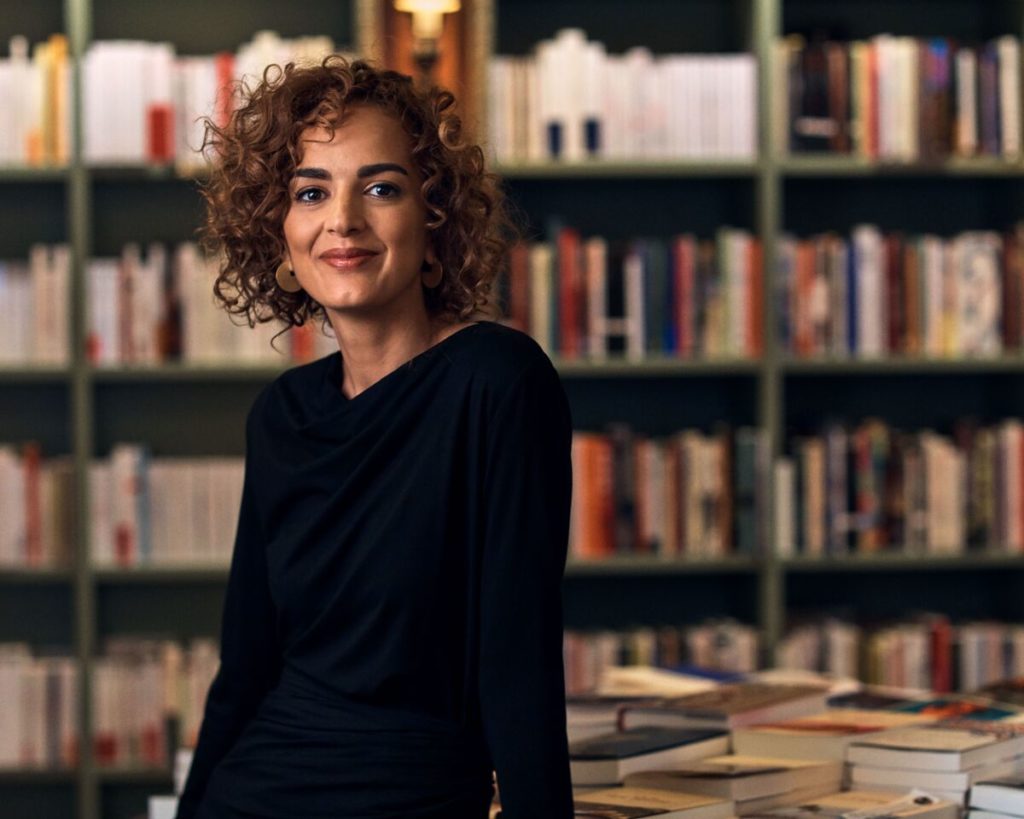
Leïla wears the Soho skirt in black, the Winfrey top in black, and the Henrietta earrings.
I HAVE A LOT OF DISCIPLINE. My parents were very strict with us growing up; they encouraged us to work hard. So for me, it is not hard to get up in the morning and sit and work. I think that’s the main problem when you are a writer: you have to get out of bed and go into your office and write, write, write. Even if you don’t have any ideas, something has to happen. When I was writing Dans le jardin de l’ogre, I became so intrigued by the main character in my novel that I wanted to know her soul, and describe what she was feeling. This obsession led me to write the book. I did not really know what I was doing. I just did it. It was very mysterious.
THE ONLY ANSWER TO PROBLEMS WITH WRITING IS WORK, WORK, WORK. The first novel I wrote felt like a lot of work. Then I met my editor, Jean-Marie Laclavetine, and he helped me find my style and my voice. It was very important to have someone who trusted me and told me, “You are a writer, and you’re going to find your own way to tell stories.” Some writers need to be lonely, and do everything by themselves, and don’t like to share their work before it’s finished, but for me it’s very different. I like to have a dialogue with my editor, explain to him what I’m trying to do, and listen to his advice.

Leïla wears the Angelou shawl in cream and the Henrietta earrings.
MY SISTERS AND I WERE RAISED TO BE INDEPENDENT FINANCIALLY, to have a career, and to never depend on the men in our lives. My parents wanted us to read and travel, to live wherever we wanted, to observe any religion. They were educated themselves, and they had the money to send us to school in France, so I think they maybe felt a duty to give us this freedom. In Morocco, it is unusual to be so open with your parents, especially for girls. The authority of the father is very important, and you are not to contradict him, but in our family we could say to my father, “I do not agree with you, and I think that what you’re saying is stupid.” My friends thought that was very strange.
IN MOROCCO, SEXUAL INTERCOURSE WHEN YOU’RE NOT MARRIED is forbidden. You can go to prison. When I was a journalist, I often spoke to young people about the problems in their lives, and many would tell me about how they didn’t have the right to intimacy with their girlfriend or boyfriend. So I decided to interview women about what their sex life was like in a country where abortion is forbidden, homosexuality is forbidden, and sexual relationships when you are not married are forbidden, and this became another book, Sexe et Mensonges. I didn’t have to convince anyone to speak with me. I received a lot of phone calls and emails from women who wanted to share their stories. Silence was very hard on these women, and their sexuality was a source of shame. A lot of them wanted to break their silence, because it was making it impossible for them to be who they really were.
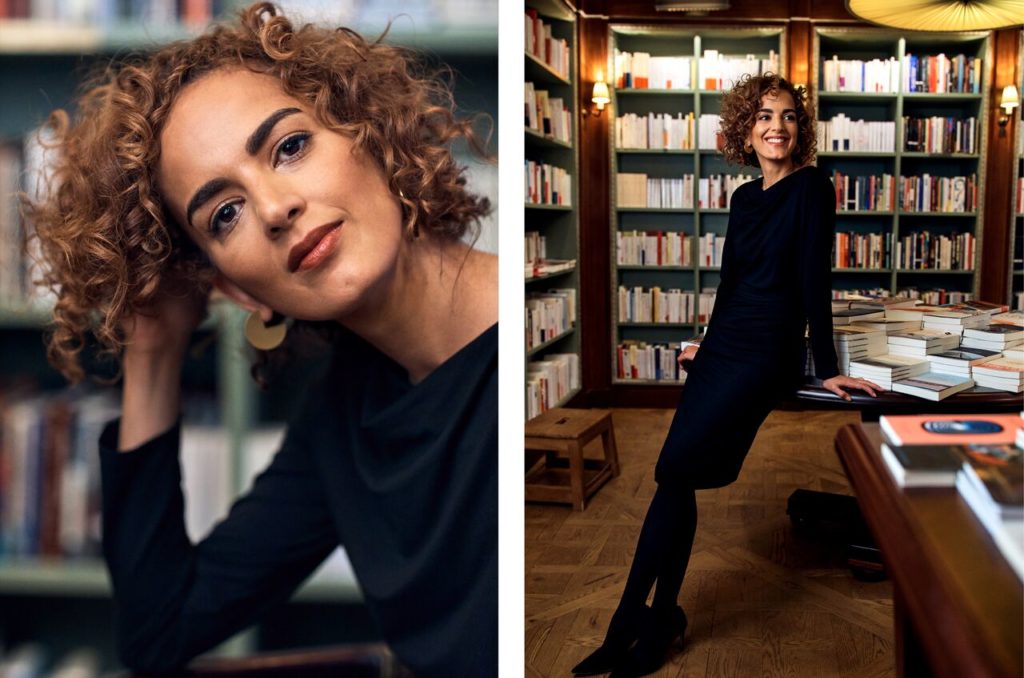
Leïla wears the Soho skirt in black, the Winfrey top in black, and the Henrietta earrings.
I COMPLETELY UNDERSTAND WHY PEOPLE CAN BE FROZEN BY SUCCESS, but it’s not the case with me because I love writing stories so much. I think the life of a writer is made of success and of failure and it’s completely normal to write good books as well as bad ones. Sometimes you need even to write a book that is less good than the one before it. I just keep sitting in front of the computer and working.
I DON’T HAVE RITUALS WITH WRITING, but I can only write in my home. It’s very difficult for me to write in a public space or when I travel. Otherwise, there are no rules. I write in the morning and the evening. I write after having one or two glasses of wine, or after I’ve had my coffee.
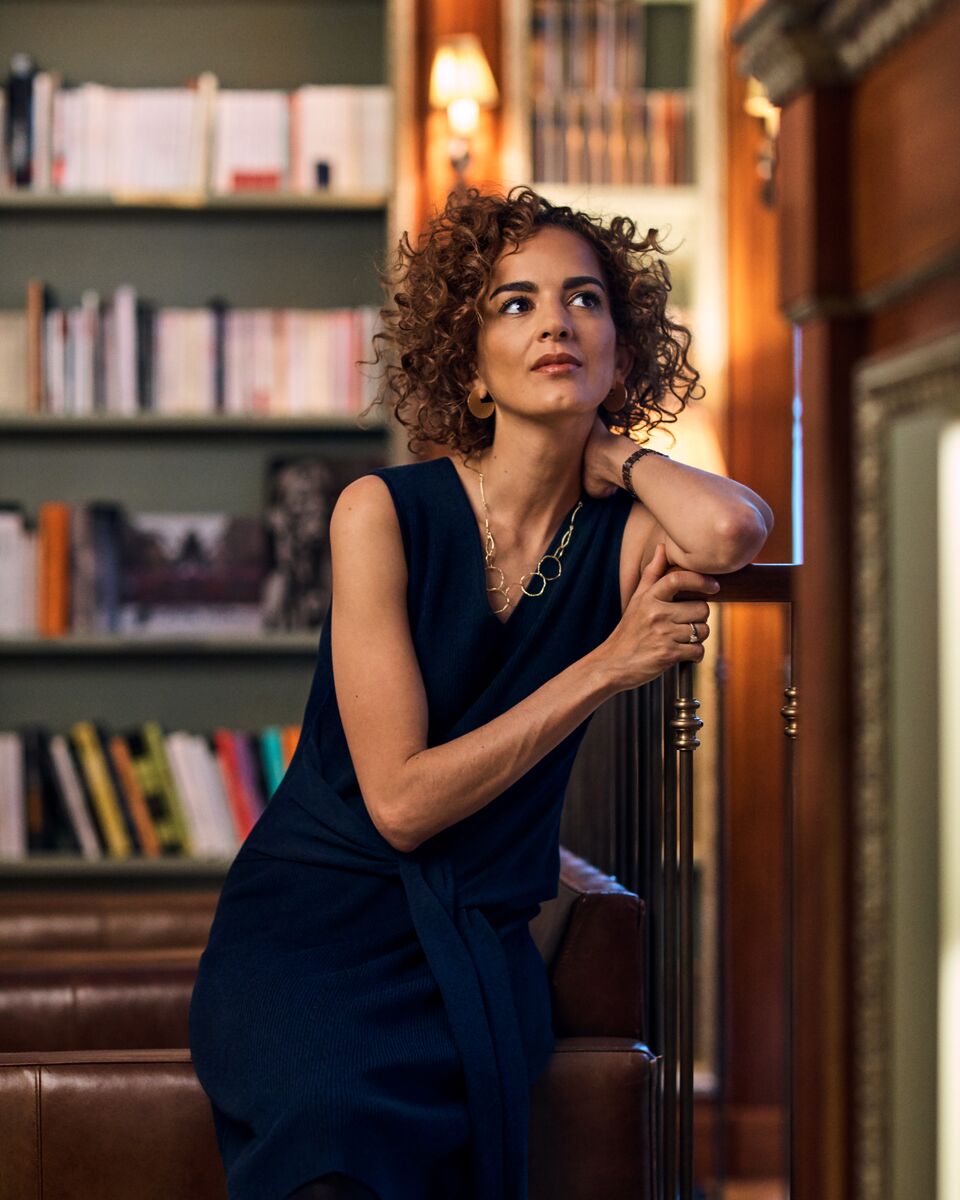
Leïla wears the Chell dress in navy, the Helene necklace, and the Henrietta earrings.
MOTHERHOOD HAS DEFINITELY AFFECTED THE CONTENT of my books. When you are a young woman or a girl, everyone tells you that motherhood is like this or like that. Then, when you become a mother yourself, you discover that the things people have told you—how natural it feels, and how much you love your children—are all a kind of myth. Sometimes you are very happy with your children, and sometimes you feel very lonely, and sometimes you don’t even want to be a mother. It’s very taboo for a woman to say that, because you’re afraid people will think you’re a bad mother. But the question is not, “Are you a bad mother or a good mother?” It’s that being a mother means you are going to do good things and bad things, and sometimes you are wrong and other times you are exactly right. That’s what I want to express in my characters. These taboo subjects are very interesting to me.
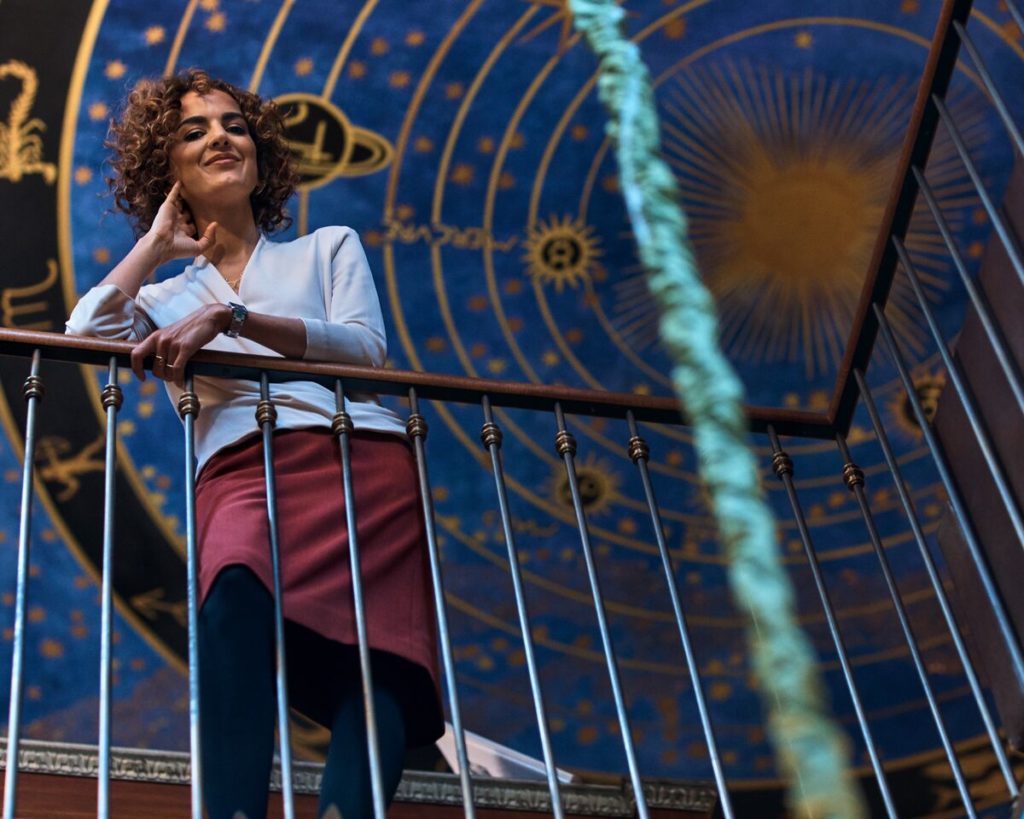
Leïla wears the Deneuve top in champagne and the Noho skirt in pomegranate.
IT’S DIFFICULT TO DEFINE MY WORK HOURS. My son says, “You’re always working, Mom.” I work on Saturdays, on Sundays, and during the holidays, because my work is my life. I’m always writing, I’m always reading. Sometimes it’s difficult for my son. But at the same time, he’s very proud. I actually think it’s easier for a child to understand what it is to be a writer than to understand other kinds of work. He says, ”Oh, okay, you’re telling stories,” and he likes this idea. He understands the boundary between my office and the rest of the house. Sometimes I hear him say to people, “You shouldn’t go there, Mommy’s working.” My son is seven but my daughter is only one, so she doesn’t understand the boundary yet.
I USED TO WORRY THAT IT WAS NARCISSISTIC or egocentric to think that I could be a novelist. I had a lot of doubts, and wondered if I was crazy. But my husband had confidence in me, and he was absolutely sure that I was going to write a good book. He said, “Take all the time you need. I support you.” I also had a feeling that writing novels was going to be a good thing. In French, we have an expression, “Je suis née sous une bonne étoile,” which means “I was born under a good star.” I think I have this good star, though I can’t explain why.
Photographs by Jeff Allen.





